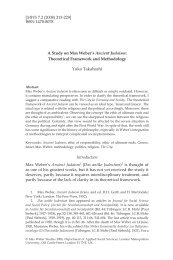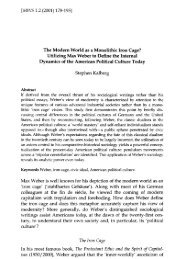Disenchantment, Enchantment and Re ... - Max Weber Studies
Disenchantment, Enchantment and Re ... - Max Weber Studies
Disenchantment, Enchantment and Re ... - Max Weber Studies
You also want an ePaper? Increase the reach of your titles
YUMPU automatically turns print PDFs into web optimized ePapers that Google loves.
16 <strong>Max</strong> <strong>Weber</strong> <strong>Studies</strong><br />
more, not less, unified with the gradual emergence of modern society<br />
from antiquity, <strong>and</strong> the ‘breaking of the spell’ that bound the premodern<br />
world (Spierenburg 1991). Gellner’s analysis of nationalism, as<br />
a consequence of the development of industrial society <strong>and</strong> a response<br />
to its functional needs (1983), is also arguably a version of this model<br />
of European history (although, to further confuse matters, nationalism<br />
can also be understood as a species of re-enchantment, what Llobera<br />
[1994] has called the ‘God of Modernity’).<br />
Further grounds for arguing that the modern world is in some<br />
respects becoming more homogenous can be found in the progress of<br />
globalization. One of the unifying <strong>and</strong>, indeed, reassuring threads in<br />
the experience of even a modest amount of long-haul travel—<strong>and</strong> it<br />
doesn’t much matter in this respect where you end up—is that the<br />
similarities between destinations, <strong>and</strong> between arrivals <strong>and</strong> departures,<br />
may increasingly be as striking as the differences. This is not<br />
simply a matter of scientific <strong>and</strong> technological convergence (although<br />
that is significant). The globalization of business, tourism <strong>and</strong>, to<br />
some extent, culture, politics, <strong>and</strong> social policy, are all phenomena to<br />
be reckoned with. In terms of values, bureaucratic (if not legal) frameworks,<br />
<strong>and</strong> the operating presumptions of daily life, the cultures of<br />
the world may now be at least as much divided by what they hold in<br />
common as by their differences from each other.<br />
Although too much can be made of the homogenizing effects of globalization,<br />
they cannot be dismissed as trivial. On the other h<strong>and</strong>, we<br />
cannot deny that pluralism <strong>and</strong> fragmentation are real, either. This, of<br />
course, is another aspect of supposed post-modernity which, in some<br />
senses, the disenchantment thesis might be thought to have anticipated.<br />
In this respect, however, as in so many others, the notion of postmodernity<br />
does not seem to possess much explanatory power. More<br />
straightforward <strong>and</strong> obvious social processes can be appealed to for<br />
that.<br />
Thus, as Hannerz argues (1992: 217-67), the ‘global ecumene’ involves<br />
convergence <strong>and</strong> polycentric variety. If nothing else, for example,<br />
it should be recognized that local primary colour is at least as<br />
marketable a commodity as the pastel tones of soothing international<br />
uniformity. There is, however, more to it than that. The homogenizing<br />
effects of globalization necessarily produce a response in the (re)invention,<br />
valorization, <strong>and</strong> assertion of locality <strong>and</strong> distinctiveness.<br />
Homogeneity <strong>and</strong> heterogeneity can no more be divorced than the<br />
formal <strong>and</strong> the informal, or similarity <strong>and</strong> difference. The one entails<br />
the other, logically <strong>and</strong> in everyday social life. Acknowledging this<br />
paradox—if that is, indeed, what it is—forces us to recognize the




